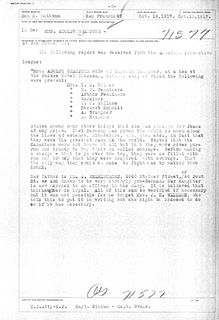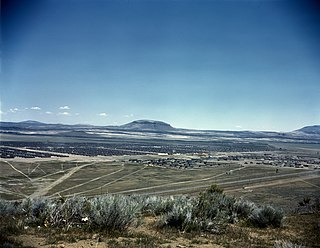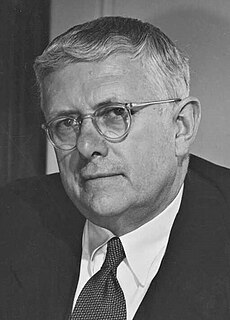Related Research Articles
Article 134 of the Uniform Code of Military Justice (UCMJ) also known as the General Article of the UCMJ is an article of military law in the United States that provides for penalties by court-martial various offences that prejudice good order and discipline or bring discredit upon the armed forces, such as for "disloyal" statements made "with the intent to promote disloyalty or disaffection toward the United States by any member of the armed forces or to interfere with or impair the loyalty to the United States or good order and discipline of any member of the armed forces."
In parliamentary systems of government, the loyal opposition is the opposition parties in the legislature. The word loyal indicates that the non-governing parties may oppose the actions of the sitting cabinet while remaining loyal to the source of the government's power. The idea of inquisitorial opposition that held the executive to account emerged in Great Britain.
Multiple choice or objective response is a form of an objective assessment in which respondents are asked to select only correct answers from the choices offered as a list. The multiple choice format is most frequently used in educational testing, in market research, and in elections, when a person chooses between multiple candidates, parties, or policies.
Pride-and-ego down is a US Army term for techniques used by captors in interrogating prisoners to encourage cooperation, usually consisting of "attacking the source's sense of personal worth" and in an "attempt to redeem his pride, the source will usually involuntarily provide pertinent information in attempting to vindicate himself."
Abraham Lincoln's position on slavery is one of the most discussed aspects of his life. Lincoln often expressed moral opposition to slavery in public and private. "If slavery is not wrong, nothing is wrong", he stated in a now-famous quote. "I can not remember when I did not so think, and feel." However, the question of what to do about it, how to end it given that it was so firmly embedded in the nation's constitutional framework and in the economy of much of the country, was complex and politically challenging.

Bad faith is double mindedness or double heartedness in duplicity, fraud, or deception. It may involve intentional deceit of others, or self-deception.

The American Protective League (1917-1919) was an organization of private citizens that worked with Federal law enforcement agencies during the World War I era to identify suspected German sympathizers and to counteract the activities of radicals, anarchists, anti-war activists, and left-wing labor and political organizations. At its zenith, the APL claimed 250,000 members in 600 cities.

The Tule Lake National Monument in Modoc and Siskiyou counties in California, consists primarily of the site of the Tule Lake War Relocation Center, one of ten concentration camps constructed in 1942 by the United States government to incarcerate Japanese Americans forcibly removed from their homes on the West Coast. They totaled nearly 120,000 people, more than two-thirds of whom were United States citizens.
The Commission on Protecting and Reducing Government Secrecy, also called the Moynihan Commission, after its chairman, U.S. Senator Daniel Patrick Moynihan, was a bipartisan statutory commission in the United States. It was created under Title IX of the Foreign Relations Authorization Act for Fiscal Years 1994 and 1995 to conduct "an investigation into all matters in any way related to any legislation, executive order, regulation, practice, or procedure relating to classified information or granting security clearances" and to submit a final report with recommendations. The Commission's investigation of government secrecy was the first authorized by statute since the Wright Commission on Government Security issued its report in 1957.

No-No Boy is a 1957 novel, and the only novel published by the Japanese American writer John Okada. It tells the story of a Japanese-American in the aftermath of the internment of Japanese Americans during World War II. Set in Seattle, Washington, in 1946, the novel is written in the voice of an omniscient narrator who frequently blends into the voice of the protagonist.

Frederick F. Reichheld is a New York Times best-selling author, speaker and business strategist best known for his research and writing on the loyalty business model and loyalty marketing. He is the creator of the Net Promoter System of management (NPS).

The Rohwer War Relocation Center was a World War II Japanese American concentration camp located in rural southeastern Arkansas, in Desha County. It was in operation from September 18, 1942, until November 30, 1945, and held as many as 8,475 Japanese Americans forcibly evacuated from California. The Rohwer War Relocation Center Cemetery is located here, and was declared a National Historic Landmark in 1992.

President Harry S. Truman signed United States Executive Order 9835, sometimes known as the "Loyalty Order", on March 21, 1947. The order established the first general loyalty program in the United States, designed to root out communist influence in the U.S. federal government. Truman aimed to rally public opinion behind his Cold War policies with investigations conducted under its authority. He also hoped to quiet right-wing critics who accused Democrats of being soft on communism. At the same time, he advised the Loyalty Review Board to limit the role of the Federal Bureau of Investigation (FBI) to avoid a witch hunt. The program investigated over 3 million government employees, just over 300 of whom were dismissed as security risks.
Hiroshi Kashiwagi was a Nisei poet, playwright and actor. For his writing and performance work on stage he is considered an early pioneer of Asian American theatre.
Three Outlaw Samurai is a 1964 Japanese chambara film by director Hideo Gosha.

Boyi or Bo Yi and his brother Shuqi or Shu Qi were two brothers who lived in China at the time of the transition between the Shang dynasty and the Zhou dynasty. They are still remembered in Chinese literary culture for their personal and moral virtue, loyalty, and pacifist idealism. Sometimes they are referred to together just as "Boyi", after the elder brother. They were natives of the state of Guzhu, a vassal state of the Shang dynasty. Boyi and Shuqi represent some paradoxes in ethics: Boyi refused to take over rule of his father's kingdom because he felt his father really preferred his younger brother and going against his father's wishes would not be in accord with filial piety to go against his father. Shuqi refused the rule because it would be unfilial to allow his older brother to be bypassed. Then, after the overthrow of the dynasty to which they were loyal, facing the dilemma of disloyally eating the food of the new dynasty or remaining loyal in spirit to the former dynasty, the two were left only with starvation.
"Gloriously Bright" is a science fiction short story by American writer Orson Scott Card, set in his Ender's Game universe. It tells the story of Han Qing-jao and Si Wang-mu as they interact with Jane, the gods of Path, the Starways Congress, and the knowledge of OCD. It appears in the January 1991 issue of Analog Science Fiction and Fact.

A leadership spill of the Australian Labor Party (ALP), then the opposition party in the Parliament of Australia, was rejected on 21 October 1954.

On November 25, 1946, U.S. President Harry S. Truman announced the creation of the President's Temporary Commission on Employee Loyalty (TCEL).
Mari Stull is an American blogger, lobbyist, and former Trump administration political appointee to the United States Department of State's Bureau of International Organization Affairs. She is alternatively known as the Vino Vixen.
References
- ↑ Ronald C. Pine. "Essential Logic: Basic Reasoning Skills for the 21st Century". University of Hawaii-Honolulu. Archived from the original on 2004-12-14.